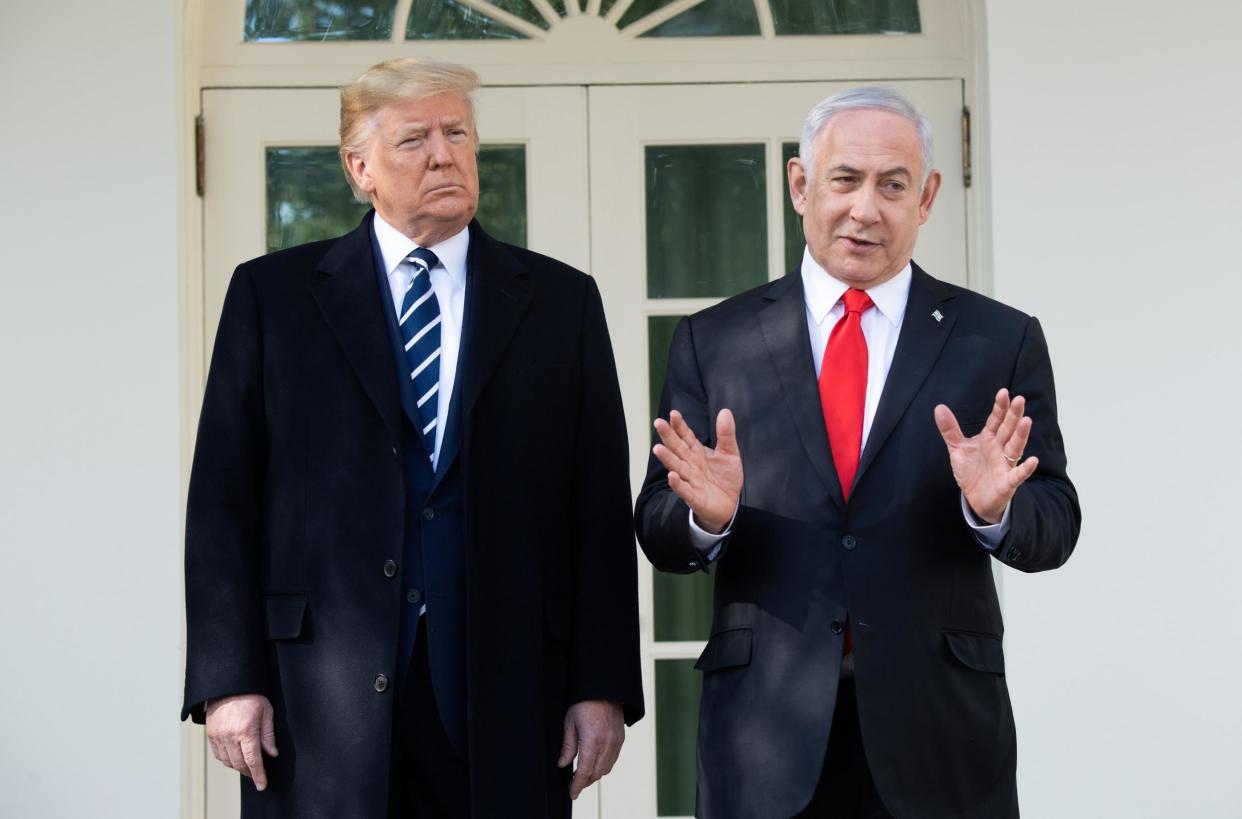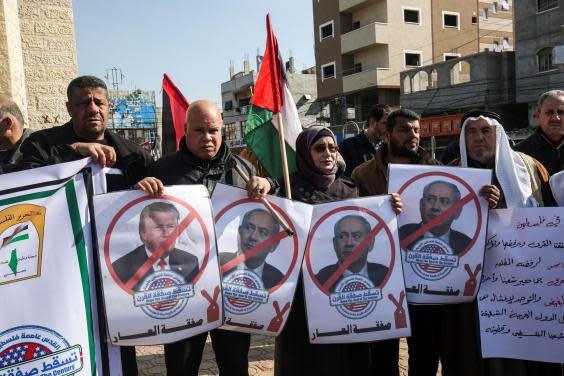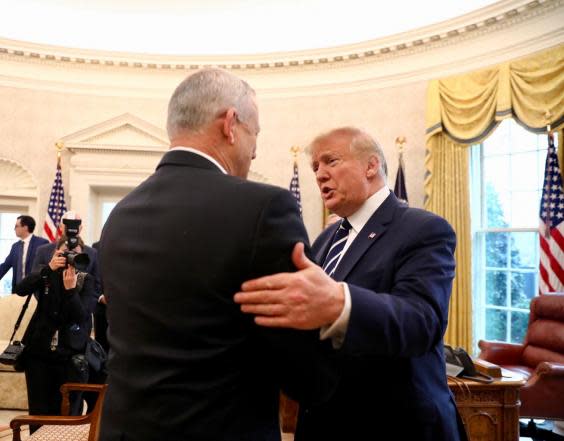Netanyahu drops request for immunity from corruption prosecution, ahead of Trump peace deal launch in DC

Israel's attorney-general has officially indited prime minister Benjamin Netanyahu after the embattled prime minister dropped a last-ditch attempt to secure immunity from prosecution in three corruption cases.
The dramatic development comes as Mr Netanyahu is in Washington for the launch of Donald Trump’s long-awaited Middle East peace plan, which according to leaks in the Israeli media is expected to be the most pro-Israeli American peace proposal yet.
The decision to file the incitement against the premier paves the way for a trial to continue, right before Israel is due to go to elections on 2 March.
Mr Netanyahu, who is Israel’s longest-running prime minister, was charged with fraud, breach of trust and bribery in November in three separate cases. He has denied any wrongdoing and repeatedly dismissed the legal proceedings as a “political witch hunt”.
He had originally sought immunity from the legal proceedings but changed his mind after it became clear Israel’s parliament the Knesset would convene on Tuesday to debate and ultimately reject his request.
Had that happened it would have dealt a humiliating blow to the prime minister as he discusses the peace agreement with president Trump.
Israeli media reported that the attorney-general filed the incitement at the Jerusalem District Court shortly after he withdrew his immunity bid.
Earlier Mr Netanyahu had written on Facebook: "In this fateful hour for the people of Israel, when I am in the United States on a historic mission to design the permanent borders of Israel and ensure our security for decades to come, the Knesset is expected to start another spectacle in the circus of removing immunity."
He added that since he “was not given due process… I decided not to allow this dirty game to continue.”
Mr Netanyahu's chief elections rival, Benny Gantz, who leads the centrist Blue and White alliance, said in a statement that "Netanyahu is going to trial - we must go forward."
"Nobody could run a country and simultaneously manage three serious criminal charges of bribery, fraud and breach of trust," Mr Gantz added.
Ayman Odeh, leader of the joint list of mostly Arab parties in the Israeli parliament, said "the path to trial is paved and no diplomatic public relations stunt in the world" would prevent him from being brought to justice.
President Trump invited both Mr Gantz and Mr Netanyahu to Washington to discuss his peace plan, which has already been rejected by the Palestinians on the grounds it will shatter their hopes of statehood.
Officials in Washington said Mr Trump, who is close to the Israeli premier, had invited them both to silence any suggestions that he was trying to influence the outcome of Israel’s March election which is once again expected to be very tight.
The two Israeli leaders are vying for the premiership of the country after both failed to form a ruling coalition following two inconclusive general elections in 2019.
Leaks in Israeli media pointed to a US peace plan that gives Israel full control over the whole of the contested city of Jerusalem which the Palestinians had hoped would serve as their capital.
The leaks said it allows Israel to annex nearly all of its settlements in the occupied West Bank, effectively giving them over a third of the territory.
The Israeli military announced they were reinforcing with infantry troops the Jordan Valley in the occupied West Bank ahead of Trump's announcement.
Some Palestinian factions have called for a “day of rage” in protest of the agreement.
Mr Trump himself is campaigning for re-election under the cloud of his impeachment trial in the Senate.
And so, some analysts have argued the timing of the release of his plan is political: both to protect him and his ally Mr Netanyahu.
On Tuesday Israel’s parliament was due to form a committee to debate, and likely reject, Mr Netanyahu’s request for immunity, which all Israeli lawmakers are permitted to apply for.
Israeli analysts said that Netanyahu's decision to drop the immunity bid was a face-saving move by his right-wing Likud party after the Ultra-Orthodox parties, who are Netanyahu’s most loyal allies, announced they were going to boycott the vote.

“Officials within the Likud said that if it became apparent, they were going to lose the vote they would just pull it, so as not to give Blue and White a political victory,” said Elizabeth Tsurkov, a fellow at the US-based Foreign Policy Research Institute.
She added the Likud had hoped the parliamentary session might be held after the elections.
“But that didn’t work. [A rejection] would look humiliating and so now the legal proceedings can continue apace.”
It is unclear if Netanyahu, who has sought to portray himself as a global statesman and the only Israeli politician able to negotiate with countries like the States, will gain from withdrawing his request.
Israeli media reported that he had agonised over submitting the immunity bid, as it undermined his position that he is innocent.
Last November Israelis attorney general Avichai Mandelblit indicted Netanyahu on corruption charges, marking the first time a serving Israeli prime minister has ever been indicted.

In Washington Mr Netanyahu was, however, upbeat Monday night after meeting Trump who he called the “greatest friend Israel has had in the White House”.
He travelled with an entourage including settler leaders and said the peace plan was the “opportunity of the century".
President Trump admitted that “without [the Palestinians], we don’t do the deal and that’s okay.”
He added “I will say, many of the Arab nations have agreed to it. They like it. They think it’s great.”
Mr Trump met Mr Gantz on Monday as well.
After the meeting, Mr Gantz thanked the US president for “his profound support of Israel's citizens and for his commitment to their security.”
He said immediately after the elections he would work towards implementing Trump’s plan “from within a stable, functioning Israeli government, in tandem with the other countries in our region.”
Read more
On eve of Trump’s Middle East peace plan, Palestinians urge boycott
Israel to open seven new nature reserves in occupied West Bank
American TV show Jeopardy says Bethlehem is in Israel, not Palestine
Netanyahu appears to accidentally reveal Israel has nuclear weapons
Israel’s Netanyahu declares victory after facing leadership challenge

